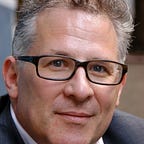Professional Supremacism: Holding on to the Past…Holding Back Our Future
Once upon a time, the American healthcare system was entirely controlled by doctors. Nurses, pharmacists, and therapists of all types were their subordinates, dependent on “doctor’s orders” to authorize the exercise of their professional discipline. Hospitals were owned by, or run almost entirely in-service to, their medical staff.
Over time, many of these other professions matured and evolved their own distinct scientific and clinical perspectives about the nature of health, illness, healing and wellness. Disciplines such as advanced practice nursing, pharmacy, psychology, the clinical therapies (occupational, physical, speech and language), and even the former “physicians assistants” — now PA’s — have all established professional identities and scope of practice standards separate and distinct from medicine.
In my experience as a Chief Medical Officer of national practice networks, most physicians have great respect for their colleagues in these professions. However, there remain those who seek to sustain a healthcare system dedicated to the principle that all health professions are not created equal and ensuring that other disciplinary perspectives on health and healing are subordinate to physician dominance and limited in their scope of practice. This is exemplified by American Medical Association’s (AMA) recent multi-million-dollar investment in their #StopScopeCreep lobbying campaign.[1]
As part of their effort, the AMA takes the position that the other healthcare professions that do not acquiesce to their control are threats to patient safety. However, comparative data speaks otherwise: there are increasing bodies of evidence, as to the value, power and safety of inclusive interprofessional collaborative practice (ICP) to equitably achieve quality and outcomes.[2],[3],[4],[5],[6],[7],[8].
The healthcare community cannot expect to overcome unconscious bias in our systems of care when we are not willing to confront our own paternalism. The AMA’s antebellum assertion of professional supremacism and suppression is anti-collaborative and counterproductive to the positive evolution of our profession and our healthcare system. Their self-selection as the final arbiters of patient safety is a bellicose abuse of power and a smokescreen to hide their primary intent to decrease competition for their economic and social capital. Decisions as to the nature of patient safety — or the nature of care, for that matter — should not be the realm of a single profession or disciplinary perspective.
Healthcare is an ecosystem, and the science of ecology has shown us that the most diverse communities are the healthiest communities[9]; the positive relationship between species diversity and community stability highlights the need to maintain the greatest richness possible within communities. This points to the need to embrace, and account for, equitable professional relationships in healthcare; the true key to patient safety and quality is collaboration, the mutually beneficial relationship between individuals or organizations who work toward common goals by sharing responsibility, authority, and accountability for achieving results — not dominance of one discipline over others.
I am in no way trying to compare disadvantage and discrimination based on race, ethnicity and culture to discrimination based on professional identity. This is about the capacity and willingness to victimize: either you are committed to health equity or you are not, and you can’t claim to wish to reduce oppression and discrimination against one group while using those very forces to oppress and discriminate against another.
We must not accept, at any level, the willingness of any group to effect and sustain the oppression and discrimination of individuals and groups based on assigned identities. Ambitious goals for improving the quality of health of individuals and communities will not be achieved by limiting scope of practice based on one professions power over others, but by responsibly supporting, not impeding, the diversity of our healthcare ecosystem and the productive evolution of all its disciplines and their associated professions. Efforts and investments should be focused on building and operationalizing frameworks to ensure equitable influence and genuine collaboration among all of our professional health-resource communities.
[1] Scope of Practice. American Medical Association website. https://www.ama-assn.org/practice-management/scope-practice/ama-successfully-fights-scope-practice-expansions-threaten Accessed May 8, 2021
[2] Sarzynski E, Barry H. Current evidence and controversies: advanced practice providers in healthcare. Am J Manag Care. 2019;25(8):366–268.
[3]Pany MJ, Chen L, Sheridan B, Huckman RS. Provider Teams Outperform Solo Providers In Managing Chronic Diseases And Could Improve The Value Of Care. Health Affairs (Project Hope). 2021 Mar;40(3):435–444.
[4] Kurtzman ET, Barnow BS. A Comparison of Nurse Practitioners, Physician Assistants, and Primary Care Physicians’ Patterns of Practice and Quality of Care in Health Centers. Med Care. 2017;55(6):615–622.
[5] Jackson GL, Smith VA, Edelman D, et al. Intermediate Diabetes Outcomes in Patients Managed by Physicians, Nurse Practitioners, or Physician Assistants: A Cohort Study. Ann Intern Med. 2018;169(12):825–835
[6] Rymer JA, Chen AY, Thomas L, et al. Advanced Practice Provider Versus Physician-Only Outpatient Follow-Up After Acute Myocardial Infarction. J Am Heart Assoc. 2018;7(17):e008481
[7] Yang Y, Long Q, Jackson SL, et al. Nurse Practitioners, Physician Assistants, and Physicians Are Comparable in Managing the First Five Years of Diabetes. Am J Med. 2018;131(3):276–283.e2
[8] Poh EW, McArthur A, Stephenson M, Roughead EE. Effects of pharmacist prescribing on patient outcomes in the hospital setting: a systematic review. JBI Database System Rev Implement Rep. 2018 Sep;16(9):1823–1873
[9] Cleland EE. Biodiversity and Ecosystem Stability. Nature Education Knowledge 2011; 3(10):14
